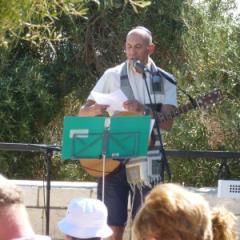
Volunteer of the Month: Cantor Evan Kent
This month we honor Evan Kent. Evan is a 1988 graduate of HUC-JIR. He also holds a BA in Music from the Manhattan School of Music, and a Master's in Public Administration from City University of New York. Currently he is completing a Doctorate in Music Education. Evan has served Temple Isaiah in Los Angeles for the past twenty-five years. He will be ending his tenure there, and along with his partner Rabbi Donald Goor, is planning to make aliyah to Israel.
Now you've been doing volunteerism for a long time now, but what are some of the different volunteering roles you've done?
I've been a board member for many years. Many years ago I was on the Pension Review committee to change some of our pension structure. I've been on the Ethics committee. I was involved with chairing the Los Angeles ACC Convention 2000, and was one of the co-chairs for services and liturgy at the San Diego Convention. More recently I've been the Cantorial representative on the CCAR's inter-marriage task force. I am currently the Cantorial representative on the CCAR Machzor committee. We've been working on that for a long time.
Did someone approach you or did you just say, “This is something I'm interested in I want to be involved with”?
I come from a family where volunteering and community is important. But it's a combination of both.
So far with everything you've done, what's been your most rewarding experience in terms of volunteer work for the ACC?
The work right now, representing the Cantor's voice and the Cantor on the new Machzor committee, and helping to chair a convention where some of the most rewarding things go on.
What influenced you to become a Cantor?
That's a really long story. I was graduated from music school and I was singing in a Catholic church and over a period of time I realized the power that liturgical music has influenced lives, transformed individuals and influenced communities. I slowly realized that how I was doing this for Catholics, how I could be doing this for Jews, which I was part of, and believed so strongly in.
You've been a Cantor for a long time. What has been your most rewarding experience, working with youth? Leading services?
The most rewarding thing is watching generations. I've been privileged to watch kids who I've named become young adults; I've watched kids who are successful Bar Mitzvah students have musical careers of their own; I think that what's most successful is becoming part of people's lives.
What are some of the biggest challenges facing the Cantorate today and, looking toward the future?
I think the biggest challenge facing Cantors is our finding our place in the American Jewish community where Jewish identity is constantly changing, and not necessarily based on a religious model. That identity is no longer synagogue centered, and what do we do with the Cantor whose entire existence is synagogue based? How do we reformulate the job of a Cantor, the vocation of a Cantor to mean more than just the synagogue?
Tell us one thing about yourself that we might not know, that you would want to learn about yourself.
Well I'm finishing a doctorate in Music and writing my dissertation right now. My subject is: Music of Jewish Summer Camp and How it influences Jewish Identity. And I find that ...after years of playing classical violin, I finally became a jazz violinist. I have a jazz band here at the Temple and I play with them once a month. We play on Friday nights. And I compete in triathlons.

